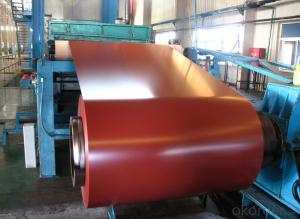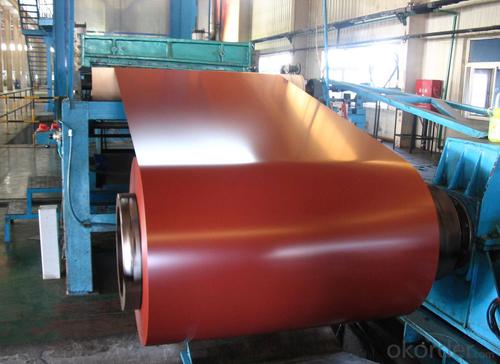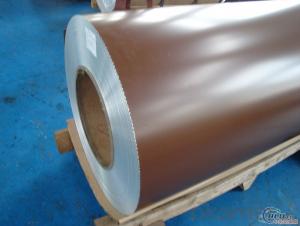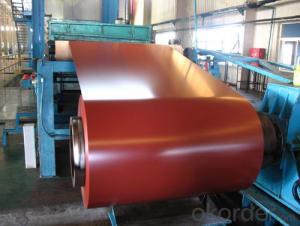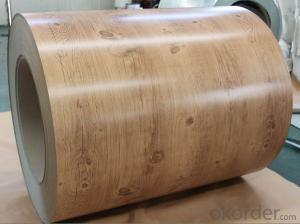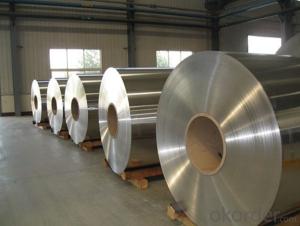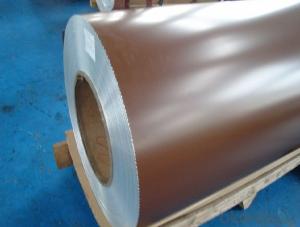China 3003 Coated Aluminum Coil for Aluminium Rolling Shutter Doors
- Loading Port:
- Shanghai
- Payment Terms:
- TT OR LC
- Min Order Qty:
- 5 m.t.
- Supply Capability:
- 60000 m.t./month
OKorder Service Pledge
OKorder Financial Service
You Might Also Like
Specification
Coated Aluminium Tape for Aluminium Rolling Shutter Doors
Description
Alloy | 1060, 1100, 3003, 8011, etc. |
Temper | H16, H18, H24, H26, H28 |
Thickness | From 0.05mm to 3.0mm |
Width | Standard width:1240mm |
Special width:1300mm, 1520mm, 1570mm, 1595mm | |
Diameter | Standard dia:1200mm |
Interior dia:150mm,405mm,505mm | |
Weight | 2.5 T/coil,3.0 T/coil |
Coating | PE, PVDF, ACRYLIC |
Surface | Embossed, mill finish, coated |
Color | AS to code RAL |
Gloss | 10-90%(EN ISO-2813:1994) |
Coating Thickness | PE: more than 18 micron |
PVDF: more than 25 micron | |
Coating Hardness(pencil resistance) | More than 2h |
Coating adhesion | 5J (EN ISO-2409:1994) |
Impact Resistance | No peeling or cracking(50 kg/cm,ASTMD-2794:1993) |
Flexibility(T-bend) | 2T |
MEK resistance | More than 100 |
Advantage | 1.High temperature resistant 2.Weathering resistant 3.Scrubbing resistant 5.Acid or alkali proof 6. Fireproof 7.Light weight material is easy to construct and install |
Out package | Wooden splint with export standard |
Application | ACP, wall cladding, facades, roofs and canopies, ceilings, signboards, blind window, display platforms, electrical panels, etc |
Manufacturing
Decoiler → Accumulator →Tension Leveler →Acid & Alkali Cleaner → Rinse →Conversion Treatment → Priming coater →Infrared Curing Oven →Main coater →Floatation Curing Oven →Strippable Film Applicator → Exit Accumulator → Recoiler
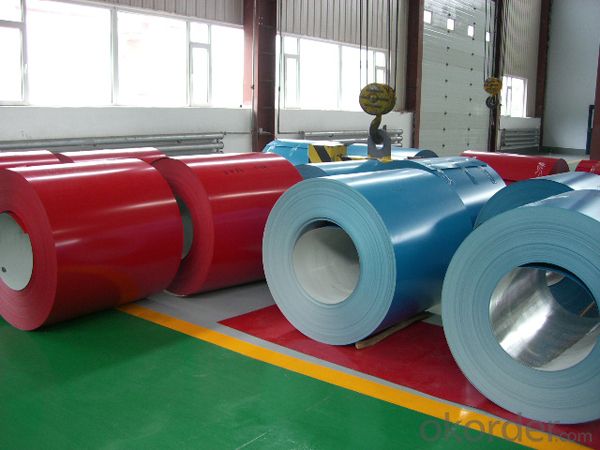
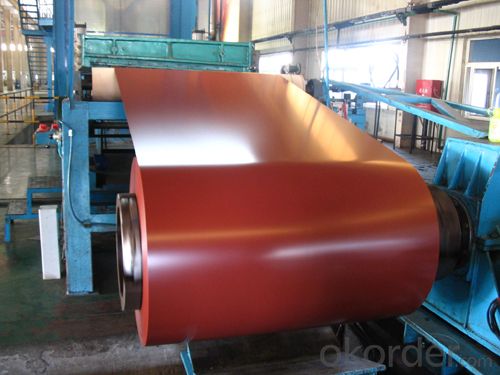
Polyester Coatings (PE)
PE (polyester) coatings exhibit an excellent combination of hardness, flexibility, flow, appearance, and superior resistance to dirt retention in indoor and outdoor applications. These coatings are highly resistant to abrasion, metal marking, staining, and marring, and require minimal maintenance. Glazetech uses polyester paints which provide excellent colour and gloss retention properties.
Polyvinylidene Fluoride Coatings (PVDF)
PVDF (polyvinylidene fluoride) is a chemical resistant thick film barrier coating commonly used in architectural applications where both excellent appearance and substrate protection must be maintained over a long period of time. This coating is unaffected by most chemicals and solvents and has excellent wear and abrasion resistance. PVDF also has a high dielectric strength, excellent resistance to weathering and the ability to self extinguish.
Application
Widely used in manufacturing of products as well as other industrial applications like:
Products Materials: PP cap stock, the traffic sign, air-conditioner heat and exchangers, food container, household foil, pharmaceutical packing, cigarettes packing etc.
Building Materials: aluminum curtain wall base plate, ACP, aluminum, ceilings, aluminum sheets, honeycomb panels and aluminum roofing, lighting decoration, household electrical appliances, food package (such as pop can cover & ring-pull), furniture ect.
FAQ
--Q: Do you provide free samples?
--A: Yes, free samples will be sent to you on freight at destination.
--Q: Can I get your latest products catalogue?
--A: Yes, it will be sent to you in no time.
--Q: What is the MOQ?
--A: 2 tons
--Q: What are your payment terms?
--A: We accept L/C, T/T.
--Q: What kinds of alloy can you supply?
--A: 1000 series: 1050, 1060, 1070, 1100, 1145, 1200
3000 series: 3003, 3004, 3105, 3104
5000 series: 5052, 5083, 5754, 5182
6000 series: 6061, 6063, 6062, 6063
8000 series: 8011, 8021
--Q: What kinds of temper can you supply?
--A: O-H112: O,H12,H14,H16,H18,H22,H24,H26,H,32,H34,H111,H112
T3, T4, T6
- Q: What are the common applications of aluminum coils?
- Aluminum coils are widely used in various industries due to their unique properties and versatility. Some of the common applications of aluminum coils include: 1. HVAC Systems: Aluminum coils are extensively used in air conditioning and refrigeration systems, where they play a crucial role in heat transfer. The lightweight and excellent thermal conductivity of aluminum make it an ideal choice for these applications. 2. Transportation Industry: Aluminum coils are commonly used in the automotive and aerospace industries. They are used to manufacture radiators, condensers, evaporators, and other heat exchange components in vehicles. The high strength-to-weight ratio of aluminum helps in reducing the overall weight of the vehicle, leading to improved fuel efficiency. 3. Construction Sector: Aluminum coils find extensive use in the construction industry. They are used in the production of gutters, downspouts, roofing, and cladding materials. Aluminum's corrosion resistance and durability make it a preferred choice for outdoor applications that require long-lasting performance. 4. Electrical Industry: Aluminum coils are used in the production of cables and wires due to their excellent electrical conductivity. They also find use in transformers and power distribution systems. 5. Packaging Industry: Aluminum coils are widely used in the packaging industry. They are used to produce various types of packaging materials, such as cans, foils, and containers. Aluminum's ability to form a barrier against moisture, light, and oxygen makes it ideal for preserving the freshness and quality of food and beverages. 6. Marine Applications: Aluminum coils are used in the marine industry for manufacturing boats, ships, and other offshore structures. Aluminum's resistance to corrosion in saltwater environments makes it a suitable choice for these applications. 7. Industrial Equipment: Aluminum coils are utilized in various industrial equipment, including heat exchangers, condensers, and evaporators. Their thermal conductivity and corrosion resistance properties make them suitable for efficient heat transfer. In summary, aluminum coils have a wide range of applications across multiple industries, including HVAC, transportation, construction, electrical, packaging, marine, and industrial equipment. Their lightweight, excellent thermal conductivity, corrosion resistance, and durability make them a preferred choice for various applications.
- Q: What are the main causes of aluminum strip rolling?
- What's the thickness of the problem? What's the width? How many rolling passes do you have?
- Q: Hi, I have a large bag of aluminium sulfate that I would like to use to turn my hydrangeas blue but there are no instructions on the pack, can anyone tell me how much I need (mixed with water)
- I usually sprinkle about 1/4 cup around the base of the plant and water it in. This must be done before flowers appear.
- Q: Can aluminum coils be used for electromagnetic shielding?
- Yes, aluminum coils can be used for electromagnetic shielding. Aluminum is a good conductor of electricity and can effectively block or divert electromagnetic radiation. Its high conductivity and ability to create a Faraday cage make it a suitable material for shielding against electromagnetic interference (EMI) in various applications such as electronics, telecommunications, and power transmission.
- Q: What are the surface treatment options for aluminum coils?
- There are several surface treatment options available for aluminum coils, depending on the specific requirements and desired outcomes. Some common options include: 1. Anodizing: This is a widely used treatment method that involves creating a protective oxide layer on the surface of the aluminum coil. Anodizing provides corrosion resistance, improves durability, and allows for color customization through dyes. 2. Painting: Aluminum coils can be coated with various types of paint to enhance their appearance, provide additional protection against corrosion, and improve resistance to UV radiation. Both liquid and powder coatings are available, with different finishes and levels of durability. 3. Coil coating: This is a continuous process where a coating material is applied to the aluminum coil's surface. The coil is then cured, resulting in a uniform and durable coating. This treatment option offers a wide range of finishes, colors, and special effects. 4. Laminating: By applying a protective film or sheet onto the surface of the aluminum coil, laminating can enhance its resistance to scratches, abrasion, and chemicals. This treatment is often used in applications where the coil may come into contact with harsh environments. 5. Brushing or polishing: These mechanical treatments can give the aluminum coil a desired texture, such as a brushed or mirror-like finish. Brushing creates a pattern of parallel lines, while polishing results in a highly reflective, smooth surface. 6. Chemical conversion coatings: These coatings are typically applied as a pre-treatment before painting or as a standalone treatment. They enhance corrosion resistance and provide a base for subsequent coatings, such as paint or powder coating. These are just a few examples of the surface treatment options available for aluminum coils. The choice of treatment will depend on factors such as the desired appearance, level of corrosion resistance, durability, and the specific application requirements.
- Q: Can aluminum coils be used in heat exchangers?
- Indeed, heat exchangers can utilize aluminum coils. The utilization of aluminum in heat exchangers is prevalent owing to its exceptional thermal conductivity and resistance to corrosion. Aluminum's remarkable thermal conductivity enables efficient heat transfer, rendering it an optimal substance for heat exchangers. Furthermore, the coils' endurance and functionality in challenging surroundings are guaranteed by aluminum's resistance to corrosion.
- Q: How are aluminum coils used in rainwater harvesting systems?
- Aluminum coils are commonly used in rainwater harvesting systems as a key component of the gutter system. These coils are used to channel and collect rainwater from the roof into the storage tanks or barrels. The coils, often placed along the edges of the roof, help in directing the flow of water into the gutters, ensuring efficient collection and storage of rainwater for various purposes such as irrigation or household use.
- Q: Can aluminum foil coil be stores for a long time?
- It is ok within one or two years, but for five or six years, it will be oxidized.
- Q: How are aluminum coils stored and transported?
- Aluminum coils are typically stored and transported in various ways depending on their size and weight. They are commonly stored in warehouses or outdoor storage facilities, where they are organized and stacked horizontally on pallets or racks. To ensure their protection, coils are often covered with a protective material such as plastic or shrink wrap. When it comes to transportation, aluminum coils are usually loaded onto trucks, containers, or flatbed trailers for long-distance journeys. To prevent damage during transit, the coils are secured using straps, chains, or other fastening methods. Additionally, specialized equipment like coil racks or cradles can be used to provide extra support and stability. Overall, proper storage and transportation practices are crucial to maintain the integrity of aluminum coils and prevent any potential harm.
- Q: This question asks for a comparison of the benefits and drawbacks of utilizing aluminum coils in food storage.
- <p>Advantages of using aluminum coils for storing food include their excellent heat conductivity, which allows for even heating and cooling, making them ideal for temperature-sensitive food items. They are also lightweight, durable, and resistant to corrosion, which enhances their longevity. Additionally, aluminum coils are recyclable, contributing to environmental sustainability. Disadvantages include potential health concerns due to the leaching of aluminum into food, especially in acidic environments. There's also the risk of denting or scratching the surface, which can compromise the integrity of the coil and lead to contamination. Moreover, aluminum coils may not be suitable for all types of food storage, particularly those requiring airtight or vacuum sealing.</p>
Send your message to us
China 3003 Coated Aluminum Coil for Aluminium Rolling Shutter Doors
- Loading Port:
- Shanghai
- Payment Terms:
- TT OR LC
- Min Order Qty:
- 5 m.t.
- Supply Capability:
- 60000 m.t./month
OKorder Service Pledge
OKorder Financial Service
Similar products
Hot products
Hot Searches
Related keywords
